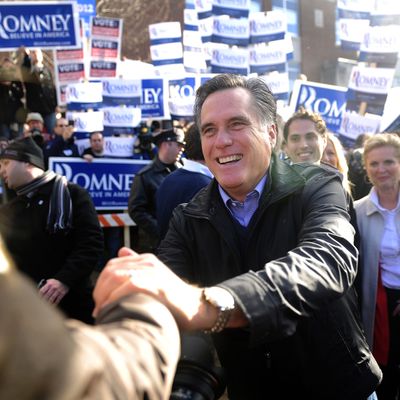
Mitt Romney’s final event before the voting started this morning in the New Hampshire primary was a rally last night at the McKelvie Intermediate School in Bedford, just outside of Manchester. The rally was well-attended, with maybe 1500 people in the house, and, like all Romney events, executed as if it were designed by a precision machine tool — starting on time, proceeding briskly, unfazed by an Ocuppy New Hampshire protest that erupted in the hall midway through Romney’s appearance. The candidate was his usual self, energetic and a little awkward. He concluded with his now-customary incantation of lines from “America The Beautiful” (with the riff on “amber waves of grain” that he used in Iowa replaced by one on the “purple mountain majesties” that could be found in New Hampshire) and a combination prediction/plea:
“You’re going to make a big statement tomorrow; let’s take it to the next step; give me the boost I need, I hope.”
That Romney would win the New Hampshire primary has been pretty much a given since he announced his candidacy last June in Stratham, 50 miles south of the home he owns on Lake Winnipesaukee. His part-time residence in the state, along with his governorship of next-door Massachusetts, makes Romney a quasi-hometown favorite, and he has been far ahead of his rivals from the get-go. The final Suffolk University tracking poll put his support at 37 percent, with Ron Paul and Jon Huntsman in a statistical tie for second at 18 and 16 percent, respectively, followed by Rick Santorum at 11 percent and Newt Gingrich at 9 percent.
New Hampshire polling is notoriously unreliable because the state’s voters are infamously fickle. But if the Suffolk numbers hold — and they are very close to those reported by the final PPP survey released yesterday — the question is whether that outcome will deliver the boost for which Romney is pining. And the answer will depend to a large extent on whether the national media judges his victory as having met or exceeded the expectations set … by the national media, of course!
The expectations game no doubt drives some readers crazy, but there is no getting around it. And while the expectations in question are set unscientifically, they are neither wholly subjective nor wildly irrational. What the press and the rest of the political class are focusing on are a pair of related metrics: the percentage of the vote and the margin of the victory that Romney claims compared to his performance in 2008. In the aftermath of the caucuses in the Hawkeye State, please recall, the credit given to Romney for his victory was tempered slightly (and fairly, I think) because of its astonishing eight-vote narrowness and the fact that he won no higher a percentage than he did four years ago — despite being the national front-runner and a thoroughly known commodity this time around. If something similar (or worse) occurs in New Hampshire, the nagging questions about Romney’s strength as a presumptive standard-bearer will persist and might even be exacerbated.
So as the results roll in tonight, keep in mind the following facts:
- Just as it was in 2008, the Republican race in New Hampshire is effectively a six-way affair, so the comparison to 2012 in terms of Romney’s percentage of the vote will be apples-to-apples.
- Last time, he finished in second place with 31.6 percent of the vote, which put him 5.5 points behind John McCain.
- Romney led by double digits in virtually every public poll conducted in 2011.
Set against those precedents, if Romney ends up with over 40 percent of the vote and a healthy double-digit win, it will be seen as an unequivocal triumph. At the other extreme, if he finishes with less than 31 percent and/or a mere single-digit win, it will be interpreted as a clear disappointment, maybe even as a kind of defeat. Any result that falls in between those poles will be read more ambiguously, though my sense of the over-under at this point is a double-digit win with 36 percent — a five-point improvement on 2008.
Above that, Romney will get his bump and head into South Carolina with the wind blowing firmly at his back. Below that, he will not, and the sense of his vulnerability will turn the contest in the Palmetto State into even more of a free-for-all than it already promises to be — which is a scary, scary thought.





























